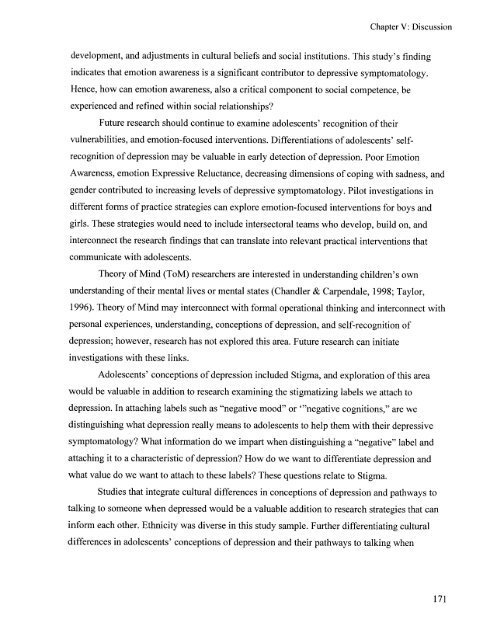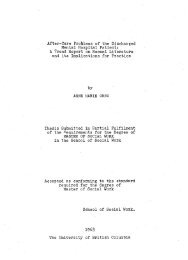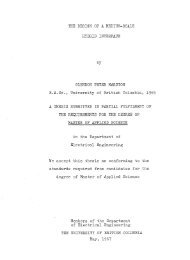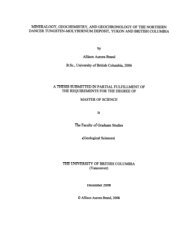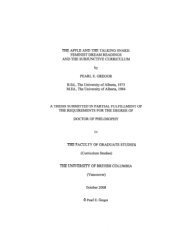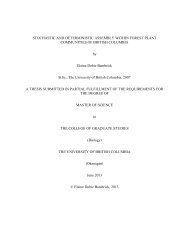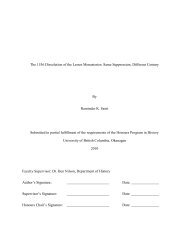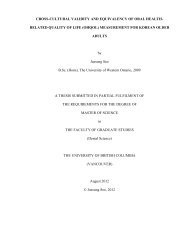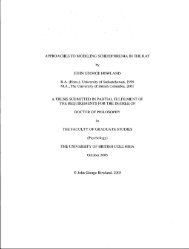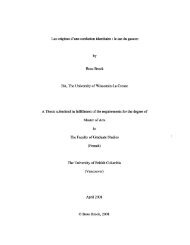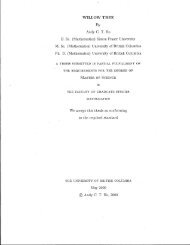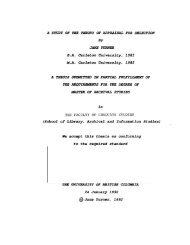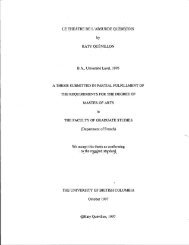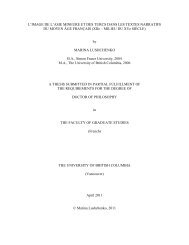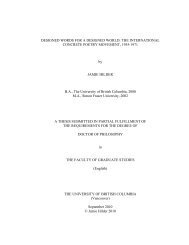how do adolescents define depression? - cIRcle - University of ...
how do adolescents define depression? - cIRcle - University of ...
how do adolescents define depression? - cIRcle - University of ...
Create successful ePaper yourself
Turn your PDF publications into a flip-book with our unique Google optimized e-Paper software.
Chapter V: Discussion<br />
development, and adjustments in cultural beliefs and social institutions. This study's finding<br />
indicates that emotion awareness is a significant contributor to depressive symptomatology.<br />
Hence, <strong>how</strong> can emotion awareness, also a critical component to social competence, be<br />
experienced and refined within social relationships?<br />
Future research should continue to examine a<strong>do</strong>lescents' recognition <strong>of</strong> their<br />
vulnerabilities, and emotion-focused interventions. Differentiations <strong>of</strong> a<strong>do</strong>lescents' self-<br />
recognition <strong>of</strong> <strong>depression</strong> may be valuable in early detection <strong>of</strong> <strong>depression</strong>. Poor Emotion<br />
Awareness, emotion Expressive Reluctance, decreasing dimensions <strong>of</strong> coping with sadness, and<br />
gender contributed to increasing levels <strong>of</strong> depressive symptomatology. Pilot investigations in<br />
different forms <strong>of</strong> practice strategies can explore emotion-focused interventions for boys and<br />
girls. These strategies would need to include intersectoral teams who develop, build on, and<br />
interconnect the research findings that can translate into relevant practical interventions that<br />
communicate with a<strong>do</strong>lescents.<br />
Theory <strong>of</strong> Mind (ToM) researchers are interested in understanding children's own<br />
understanding <strong>of</strong> their mental lives or mental states (Chandler & Carpendale, 1998; Taylor,<br />
1996). Theory <strong>of</strong> Mind may interconnect with formal operational thinking and interconnect with<br />
personal experiences, understanding, conceptions <strong>of</strong> <strong>depression</strong>, and self-recognition <strong>of</strong><br />
<strong>depression</strong>; <strong>how</strong>ever, research has not explored this area. Future research can initiate<br />
investigations with these links.<br />
A<strong>do</strong>lescents' conceptions <strong>of</strong> <strong>depression</strong> included Stigma, and exploration <strong>of</strong> this area<br />
would be valuable in addition to research examining the stigmatizing labels we attach to<br />
<strong>depression</strong>. In attaching labels such as "negative mood" or 'negative cognitions," are we<br />
distinguishing what <strong>depression</strong> really means to a<strong>do</strong>lescents to help them with their depressive<br />
symptomatology? What information <strong>do</strong> we impart when distinguishing a "negative" label and<br />
attaching it to a characteristic <strong>of</strong> <strong>depression</strong>? How <strong>do</strong> we want to differentiate <strong>depression</strong> and<br />
what value <strong>do</strong> we want to attach to these labels? These questions relate to Stigma.<br />
Studies that integrate cultural differences in conceptions <strong>of</strong> <strong>depression</strong> and pathways to<br />
talking to someone when depressed would be a valuable addition to research strategies that can<br />
inform each other. Ethnicity was diverse in this study sample. Further differentiating cultural<br />
differences in a<strong>do</strong>lescents' conceptions <strong>of</strong> <strong>depression</strong> and their pathways to talking when<br />
171


